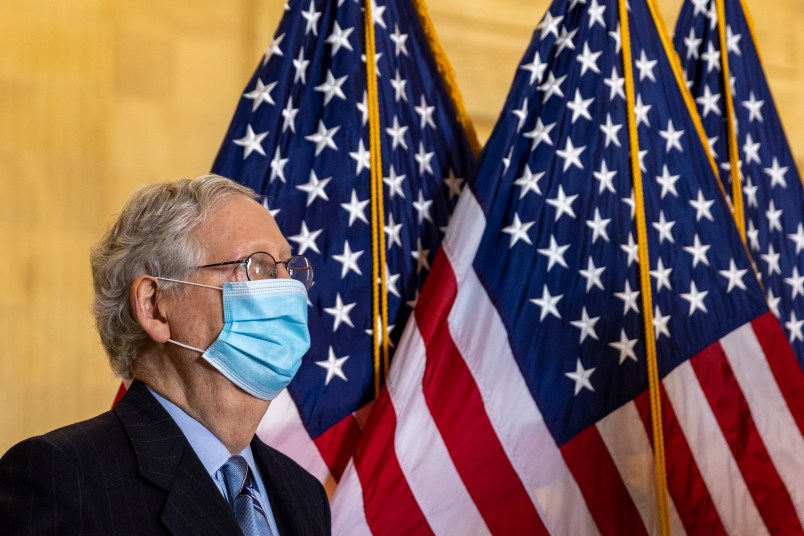Senate Minority Leader Mitch McConnell (R-KY) signaled openness to a bigger infrastructure package Sunday, a potentially positive sign to open a week peppered with bipartisan meetings and negotiations.
“The proper price tag for what most of us think of as infrastructure is about six to $800 billion, which Shelley Moore Capito, of my conference, has put together and recommended as a bill that’s related to the subject,” McConnell said during an interview with Kentucky Educational Television before bashing President Joe Biden’s proposal.
Capito’s proposal actually only rang in at $568 billion, making McConnell’s accepted range a significant step up.
Of course, Biden’s plans — two complementary pieces, a $2.3 trillion physical infrastructure column and a $1.8 trillion human infrastructure column — dwarf both Republicans’ estimates. But for negotiating purposes, it’s still something.
This week will see Biden meet with congressional leadership, including McConnell and House Minority Leader Kevin McCarthy (R-CA), and a group of Senate Republicans who have been spearheading the infrastructure counter-proposal. While it behooves the White House to look like they’re entertaining Republican proposals even if they ultimately go it alone with Democrats, multiple Democratic members have floated collaborating with Republicans on a narrower “roads and bridges” kind of bill, then bundling remaining provisions into a reconciliation vehicle.
The effort is also required, as senators like Joe Manchin (D-WV) have insisted on trying a bipartisan route before settling on partisan legislation.
The two sides still disagree on how to pay for the proposals though. Republicans have forbade deficit spending and any change to the tax code post-former President Trump’s 2017 tax cuts, leaving few options.
“The way to pay for infrastructure is through the gas tax that already exists, and the gap between that and what we’re willing to spend here needs to be credibly paid for, and the best way to pay for infrastructure is with the people who use it,” McConnell said during the Sunday interview.
Biden wants to pay for the infrastructure plans by raising taxes on the wealthy and corporations.
Democrats, meanwhile, are wary of spending too much time on bipartisan negotiations. Lessons from the Obama years well-learned, they’re suspicious of being strung along by Republicans given the excruciatingly short window they have to legislate before members shift their focus to reelection.
“I think there is a good reason for us to proceed with sincere bipartisan negotiations in the next few weeks, not indefinitely, as long as it’s making real progress,” Sen. Chris Coons (D-DE) told reporters a couple weeks ago, adding: “We don’t have a path towards passing $2.3 trillion by reconciliation, without trying.”
This post has been updated.







Hot dog! McConnell wants to work in a bipartisan way for the good of the country!!! Things are truly turning around.
Also, I have a bridge in Manhattan that I really need to get off my hands. PM me. Serious offers only.
Smoke and Mirrors, that’s all. Look squirrel!
Mitch doesn’t photograph well. Mitch doesn’t negotiate or compromise very well. Mitch doesn’t act as a decent human being very well.
Some of us live in a state with one of the lowest gas taxes, which they do want to raise, but somehow the Republicans will try and insert a tax break on businesses. Besides I always thought the gas tax was for maintenance of current infrastructure?
And frankly where was this plan in previous 4 years? We four years of “the Infrastructure Week announcement will be in the next week or two”.
He still doesn’t get that he’s a nonfactor in these negotiations and that it doesn’t matter what he does or doesn’t think. He rendered himself irrelevant when he announced that his number one legislative goal was to stop Biden. The only question is whether or not a few members of his caucus think they can survive voting against a popular infrastructure bill. That’s the only question that has anything to do with him at all.